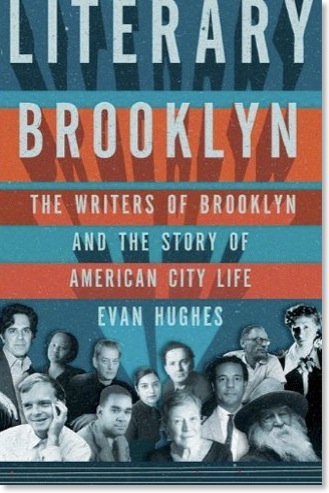
A quiet escape from the raucous pounding of urban life. A trove of cheap rents and spacious dwellings. A flawed and unpredictable muse. An embattled ground where American life thrives and decays. A creative retreat for literary rebels of the day.
Brooklyn has assumed multiple identities in the minds of writers since it landed on the pages of Walt Whitman’s Leaves of Grass. But above all, writers say it was and still is, simply a good place to live and write.
In the last twenty years, Brooklyn has lured more and more writers across the bridge. In Literary Brooklyn: The Writers of Brooklyn and the Story of American City Life, Evan Hughes explains how Brooklyn’s rise as a cultural hub has been long coming, and only in the last few decades has it attained the status of fashionable locale for aspiring and established writers.
Even as Brooklyn has cultivated its own distinct character, it is often juxtaposed with Manhattan as the quiet alternative, the blue-collar suburb, the bare-knuckle community.
Borough president Marty Markowitz likes to call it “New York’s Left Bank”.
Hughes chronicles this complex evolution that has molded Brooklyn into a haven for writers. The differences can be overstated, but ultimately spring from an incontrovertible truth that Brooklyn, as Hughes describes, is “more human in scale” and “slower to hunger for the new.” In a matter of words, it is more representative of the “American urban life.”
Hughes braids together strands of literary biography with American history, leading first with the personal stories of Brooklyn writers, and then weaving in the historical events and movements that continuously shape and re-shape neighborhoods: the construction of the Brooklyn Bridge and Robert Moses’ Brooklyn Queens Expressway, the Great Depression, the crack epidemic in the 80’s, and the early waves of Italian, Irish, and Jewish immigrants.
The book unfolds starting with the most famous Brooklyn bard, Walt Whitman, whose unconventional verse broke with the American literary tradition of the day. Raised in Brooklyn when it was still its own city, Whitman became the poet of the people through his all-encompassing voice.
Hughes calls Whitman “Brooklyn’s first literary hipster,” who captured the “democratic spirit” of America. For Hughes, Whitman is the precursor to Brooklyn’s “rebel” literary tradition born from the notion that writers who live in the borough, whether raised there or just temporary residents, are by nature outsiders, non-conformists, or drifters.
Henry Miller, whose “underdog status” Hughes says was intrinsically linked to his sense of self. Miller revolted against the literary norms of the day and embraced provocative subjects in a brazen style that prompted officials in the US to ban his books for decades. If there were a musical chorus to this book, it would go something like “Brooklyn writers go against the grain.” And in most cases, Hughes is right.
Hart Crane, who lived in Brooklyn Heights, pursued his “ecstatic goal” in his work at a time of profound cynicism in American poetry. Marianne Moore left Greenwich Village for the quiet of Fort Greene, where she continued to focus on aesthetics over the political debates that were wedging their way into literary circles. And three Jewish, Brooklyn-born writers, Daniel Fuchs, Bernard Malamud and Alfred Kazin, all experienced and wrote about what Hughes described as a “powerful combination of alienation and assimilation” from their struggles growing up in a poor, immigrant communities in Brooklyn.
There is no doubt that these writers, spread out across the borough, were uncompromising in their pursuit of their craft, but that isn’t necessarily a quality unique to Brooklyn. It is a pervasive quality of great writers and great thinkers. And as Hughes acknowledges, a neighborhood, that offers affordable housing to people in a traditionally low paying profession, will inevitably attract a more robust creative community.
Brooklyn is always in a state of flux, and right now, gentrification lingers on the tip of every writer’s tongue. It is easy to lament the loss of mom-and-pops stores, the escalating rents, the chronic displacement of communities. Hughes’ strength is shedding light on the cyclical nature of these changes. He is a master at connecting the dots from Richard Wright to Paula Fox, and showing that this is neither the first nor the last time that the status of Brooklyn will rise and fall in the literary world.


Leave a Reply